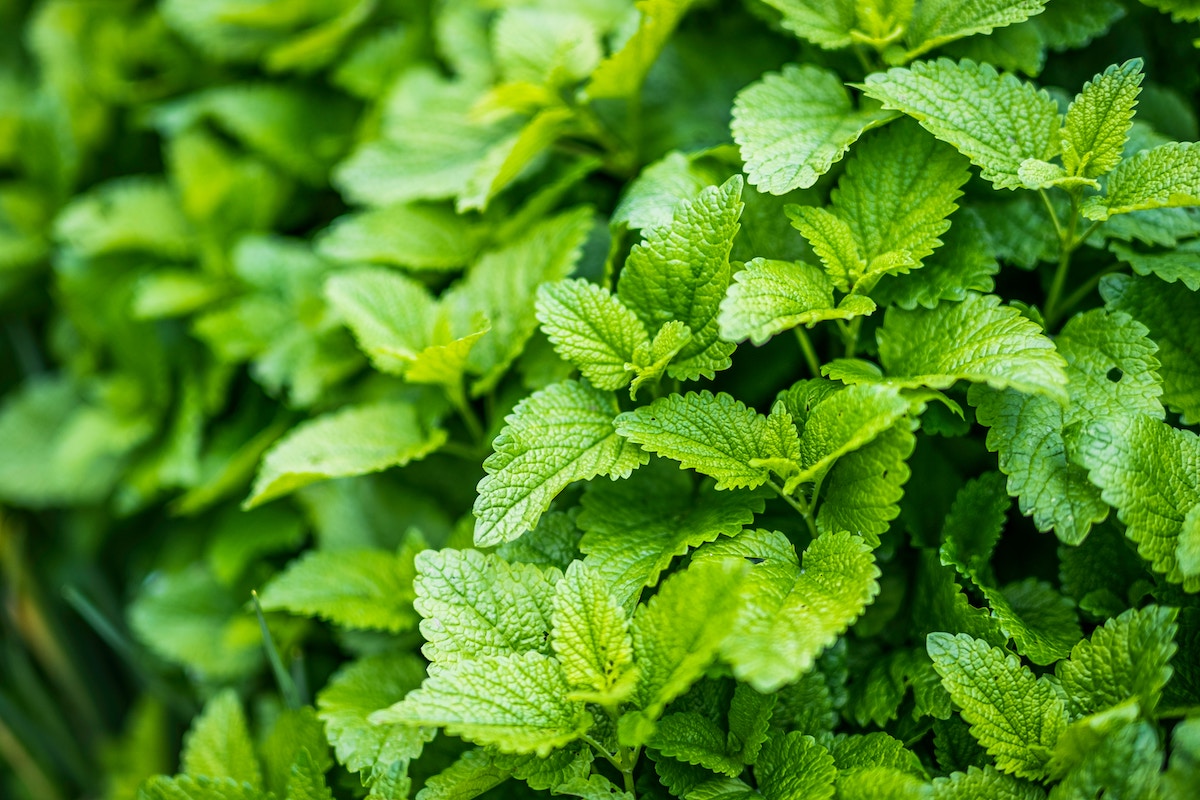Lemon Balm Beneifts

Lemon balm (Melissa officinalis), also known as bee balm or wild lemon, is a flowering plant native to Europe and Asia. It is a member of the mint family and grows up to 2 meters tall.
The leaves are small, oblong, and smooth with a lemon scent. The flowers are small, bell-shaped, and white with a pink center.
Lemon balm is an antidepressant, anti-inflammatory agent, and mosquito repellent. It’s been used for its medicinal properties since the 17th century and can be found in gardens and on the edges of woods across much of the northern hemisphere.
The spicy-lemon scent of its leaves makes it an attractive plant to have around, not just because of its fragrance but also because it’s practical and pretty. In addition to its pleasant aroma, Lemon Balm has many benefits for your health, which we’ll explore in this article.
Health Benefits of Lemon Balm
- Relaxation - Lemon balm is considered a nervine, which helps to calm and relax the mind and senses. Lemon balm is also an antiseptic, which helps to fight against infections. Lastly, lemon balm is a sedative that can help to promote sleep.
- Lemon balm is a natural antidepressant and has anti-inflammatory properties.
- Lemon balm may help treat anxiety, depression, headaches, and cramps.
- Lemon balm is also known to help improve memory and circulation.
- Lemon balm can also be used as a sedative to relax the mind and body.
- Lemon balm can help improve mood and cognitive function.
Lemon Balm Research
According to a study published in Phytotherapy Research, lemon balm can help improve mood and cognitive function in people with anxiety disorders. The study participants were divided into two groups: one group was given lemon balm extract (containing 0.8% citral and 0.2% limonene) directly sprayed on their skin.
In contrast, the other group received a placebo. The researchers found that Lemon balm extract effectively reduced anxiety symptoms in both groups.
Lemon balm is also known to improve cognitive function and memory in people without anxiety disorders. A study published in BMC Complementary and Alternative Medicine found that lemon balm can improve cognitive function and memory in adults with mild cognitive impairment (MCI).
The study participants were given either a lemon balm extract or a placebo for 12 weeks. The researchers found that both groups improved their cognitive function.
Research has shown the health benefits of citronella, like the reduction of symptoms of PMS, management of blood pressure and cholesterol, relief of colic, as well as its antiviral properties. Overall, these research studies suggest lemon balm can be a safe and effective source for treating anxiety. Although it is still early, some studies on humans have shown promise in using lemon balm to help induce feelings of body peace, especially in times of stress.
Several studies have shown that lemon balm, combined with other calming herbs such as valerian, hops, and Chamomile helps decrease anxiety and promotes sleep. Lemon balm is often said to relieve stress and anxiety, which contains a compound known as rosmarinic acid, which has powerful anti-oxidant and anti-microbial properties.
Lemon balm is believed to help lower stress and anxiety, promote sleep, boost cognitive function, combat viruses, and alleviate digestive symptoms. Lemon balm can be used for digestive issues. It can also be used for anxiety relief because it has soothing properties that help relax and improve your mood.
One study showed that combining lemon balm and Persian lavender might help enhance depression and anxiety for those with insomnia and decrease overall insomnia severity. Taking lemon balm tea regularly can help to improve mental cognitive function and can increase the quality of sleep. Helps with ADHD in children -- Perhaps due to its calming effects, lemon balm can decrease hyperactivity and impulsivity and increase attention span in some school children.
Studies have shown that 1200 mg of lemon balm per day significantly reduced the total symptoms of PMS, including psychosomatic symptoms, anxiety, and poor sleep, among teenage women. According to Australian researchers, a sugared water-based beverage with 0.3g lemon balm extract significantly reduced stress.
It increased mood in a healthy young adult population compared to a placebo. Improves focus: A study investigating the effects of consuming 300 mg of lemon balm extract on stress and cognitive functions found that 300 mg significantly improved mathematical alertness and instant recall over baseline.
How to use lemon balm
- Lemon balm herbal tea: A simple way to use lemon balm is to make a herbal tea by steeping 2-3 teaspoons of dried lemon balm leaves in a cup of boiling water. Drink daily, 2-3 cups a day.
- Lemon balm oil: For topical use, you can extract the essential oils from the lemon balm leaves and apply the oil to insect bites, sunburns, or other skin irritations as a herbal remedy. This can also be mixed with other essential oils for a personalized blend.
- Lemon balm cream: You can also make your lemon balm cream by mixing dried lemon balm leaves with a small amount of coconut oil. Keep in a jar and apply as needed to insect bites, sunburns, and skin irritations.
Side Effects of Using Lemon Balm
Allergic reactions to lemon balm are rare but may occur in people sensitive to the mint family. This can include itching, hives, and swelling of the lips, mouth, and throat.
If you are already taking prescription medications or have a medical condition, check with your doctor before taking lemon balm as it couldI interact with certain drugs.
People with hormone-sensitive cancers, such as breast and prostate cancer, should avoid using it.
sources:
https://www.mountsinai.org/health-library/herb/lemon-balm
https://www.gaiaherbs.com/blogs/herbs/lemon-balm
https://www.iherb.com/blog/nine-health-benefits-of-lemon-balm/375
https://www.verywellhealth.com/the-health-benefits-of-lemon-balm-89388
https://feastandfarm.com/14-lemon-balm-benefits
https://www.viridian-nutrition.com/blog/brain-health/top-8-health-benefits-of-lemon-balm
https://botanicalinstitute.org/lemon-balm
https://senchateabar.com/blogs/blog/lemon-balm-tea
https://www.tuasaude.com/en/lemon-balm
